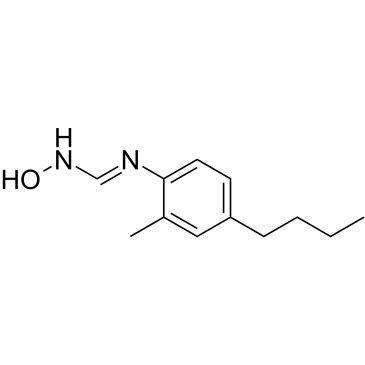| Description |
HET0016 is a potent and selective 20-hydroxyeicosatetraenoic acid (20-HETE) synthase inhibitor, with IC50 values of 17.7 nM, 12.1 nM and 20.6 nM for recombinant CYP4A1-, CYP4A2- and CYP4A3-catalyzed 20-HETE synthesis, respectively. HET0016 also is a selective CYP450 inhibitor, which has been shown to inhibit angiogenesis and tumor growth[1][2].
|
| Related Catalog |
|
| Target |
17.7 nM (CYP4A1), 12.1 nM (CYP4A2), 20.6 nM (CYP4A3)[1], CYP450[2]
|
| In Vitro |
HET0016 is a selective, non-competitive and irreversible inhibitor of CYP4A [1]. HET0016 (100 μM; 24 hours, 48 hours) decreases migration and invasion of breast cancer metastatic cells [2]. Cell Proliferation Assay[2] Cell Line: MDA-MB-231 cells Concentration: 100 μM Incubation Time: 24 hours, 48 hours Result: Decreased migration and invasion of breast cancer metastatic cells
|
| In Vivo |
HET0016 (10 mg/kg/day; i.v.; for 3 weeks) reduces tumor volume and lung metastasis in an immunocompetent breast cancer mouse model[2]. HET0016 reduces the metalloproteinases’ levels in the lungs via PI3K/AKT pathway in mice[2]. HET0016 decreases expression of pro-inflammatory and growth factors and granulocytic MDSCs population in lung microenvironment[2]. HET0016 protects BBB dysfunction after I/R by regulating the expression of MMP-9 and tight junction proteins[3]. Animal Model: 4–5 weeks female Balb/c mice (16-18 g)[2] Dosage: 10 mg/kg/day Administration: Intravenously; 5 days a week; for 3 weeks; starting from day 15 of tumor implantation Result: Reduced tumor volume and lung metastasis.
|
| References |
[1]. Seki T, et al. Cytochrome P450 4A isoform inhibitory profile of N-hydroxy-N'-(4-butyl-2-methylphenyl)-formamidine (HET0016), a selective inhibitor of 20-HETE synthesis. Biol Pharm Bull. 2005 Sep;28(9):1651-4. [2]. Borin TF, et al. HET0016 decreases lung metastasis from breast cancer in immune-competent mouse model. PLoS One. 2017 Jun 13;12(6):e0178830. [3]. Liu Y, et al. The protective effect of HET0016 on brain edema and blood-brain barrier dysfunction after cerebral ischemia/reperfusion. Brain Res. 2014 Jan 28;1544:45-53.
|
